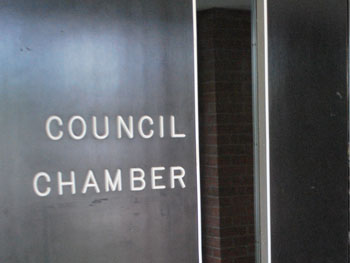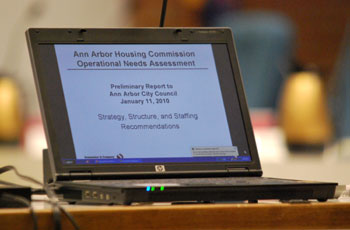June 3, 2013 Ann Arbor Council: In Progress
The Ann Arbor city council’s June 3, 2013 meeting agenda features two significant topics that will have an impact on the future of public housing and public transportation in the city.
The council will be asked to vote on a series of resolutions related to a proposed conversion of the city’s 355 public housing units to a project-based voucher system under HUD’s Rental Assistance Demonstration (RAD) program. The council had been briefed at a Feb. 11, 2013 work session on the details of the proposal.
Key steps the council will be asked to take on June 3 include transferring ownership of properties managed by the Ann Arbor Housing Commission (AAHC) from the city of Ann Arbor to the AAHC. Because it involves the transfer of a land interest, approval will require an 8-vote majority on the 11-member council. The properties would eventually be owned by a public/private partnership. The AAHC selected a co-developer earlier this year at its Jan. 10, 2013 meeting.
AAHC is seeking to undertake with this initiative in order to fund several million dollars worth of needed capital improvements. On the RAD approach, they would be funded in large part through low-income housing tax credits (LIHTC). The council will also be asked to approve a payment in lieu of taxes to the AAHC, so that no property taxes will be owed by AAHC.
The AAHC had originally conceived of converting its properties to project-based vouchers in phases over a few years. The impact of federal sequestration had led AAHC to contemplate converting all the properties this year, to soften part of that impact. However, a hoped-for change in HUD’s rules that would allow the all-in-one-go approach was not made, AAHC learned last week. So “Scenario 3″ described in the staff memo accompanying the council resolution is no longer possible. The negative financial impact of that HUD decision totals around $550,000 over the course of three years.
On the public transportation side, the council will be asked to approve a change to the articles of incorporation for the Ann Arbor Transportation Authority. The change will admit the city of Ypsilanti as a member of the authority, and expand the AATA board from seven to nine members. The name of the authority would change to Ann Arbor Area Transportation Authority. One of the board members would be appointed by the city of Ypsilanti.
The request comes in the context of a demised attempt in 2012 to expand the AATA to all of Washtenaw County. Since then, conversations have continued among a smaller cluster of communities geographically closer to Ann Arbor. Previous Chronicle coverage includes “Ypsilanti a Topic for AATA Planning Retreat” and “Ypsi Waits at Bus Stop, Other Riders Unclear.”
While the change will affect the governance of the AATA, the goal of the governance change is to provide a way to generate additional funding for transportation. The AATA could, with voter approval, levy a uniform property tax on the entire area of its membership – but the AATA does not currently do that. The cities of Ann Arbor and Ypsilanti currently levy their own millages, which are transmitted to the AATA. However, Ypsilanti is currently at its 20-mill statutory limit. A millage levied by the AATA would not count against that 20-mill cap.
Other significant items on the council’s June 3 agenda include a resolution encouraging the Ann Arbor Downtown Development Authority to allocate funding for three police officers. The council will also be considering a final vote on ordinance changes to which it’s already given initial approval: public art (eliminating the 1% capital project budget set-aside); utility rate increases (an annual item); and a reduction in utility improvement charges imposed on first-time connections.
In anticipation of the upcoming July 4 holiday, the council may also take initial action on an ordinance that would restrict use of fireworks to the hours of 8 a.m. to midnight. The local regulation is only possible as a result of a change in the state law that has been passed by the Michigan House and is expected to be ratified and signed into law before July 4. The item had not yet been added to the city council’s agenda as of 4 p.m. today.
Other agenda items are available on the city’s Legistar system. Readers can also follow the live meeting proceedings on Channel 16, streamed online by Community Television Network.
The Chronicle will be filing live updates from city council chambers during the meeting, published in this article “below the fold.” [Full Story]





